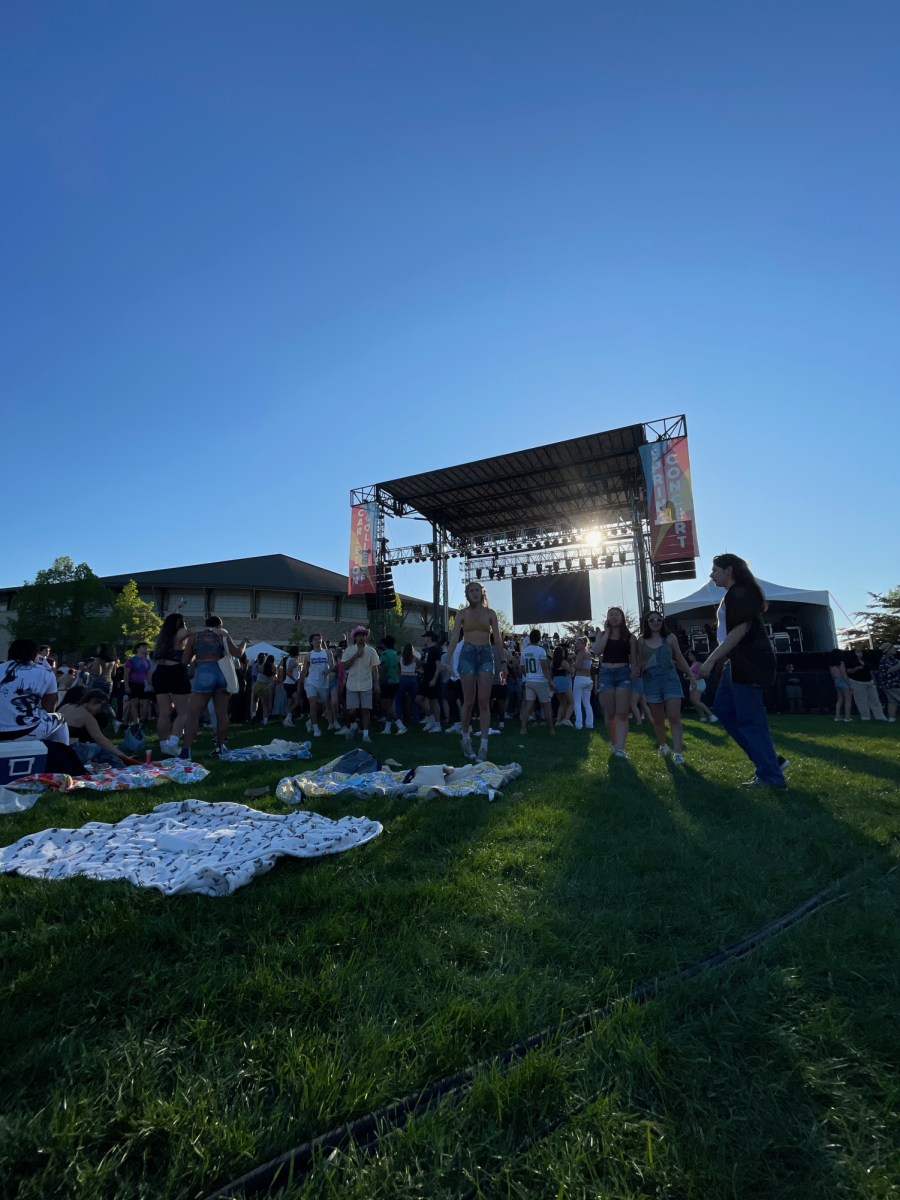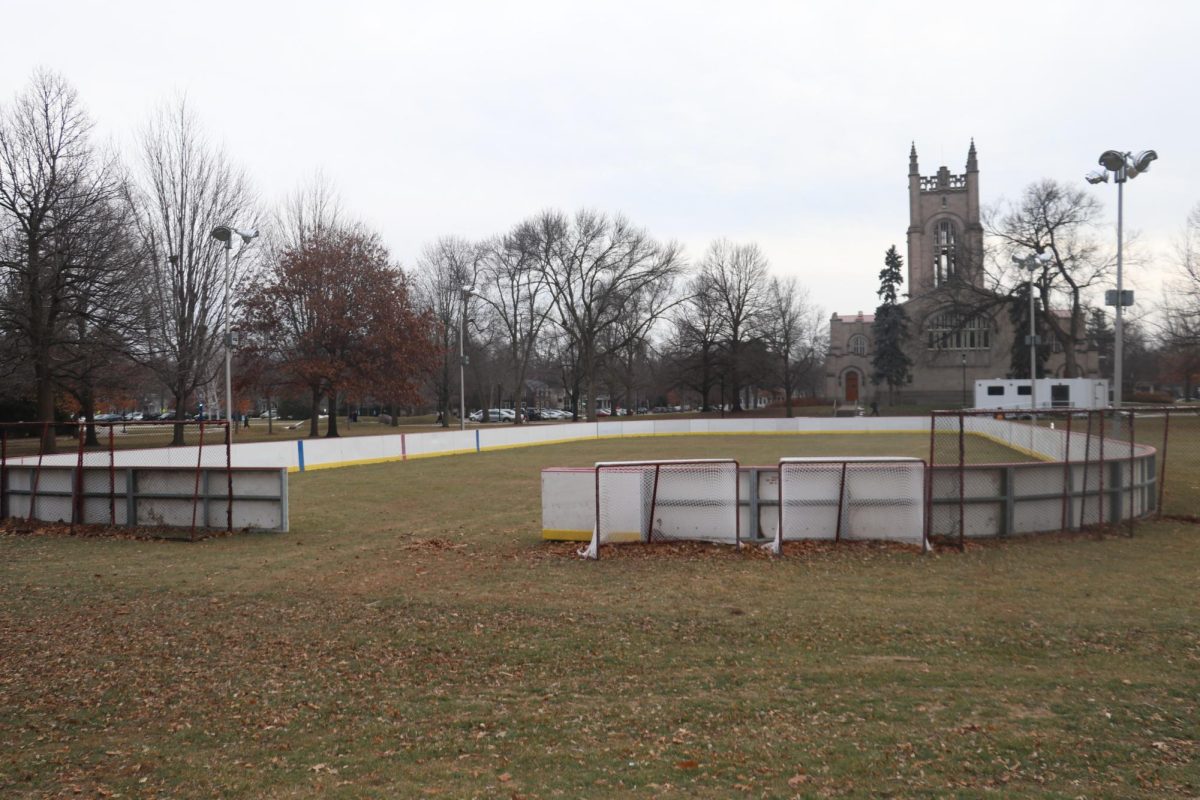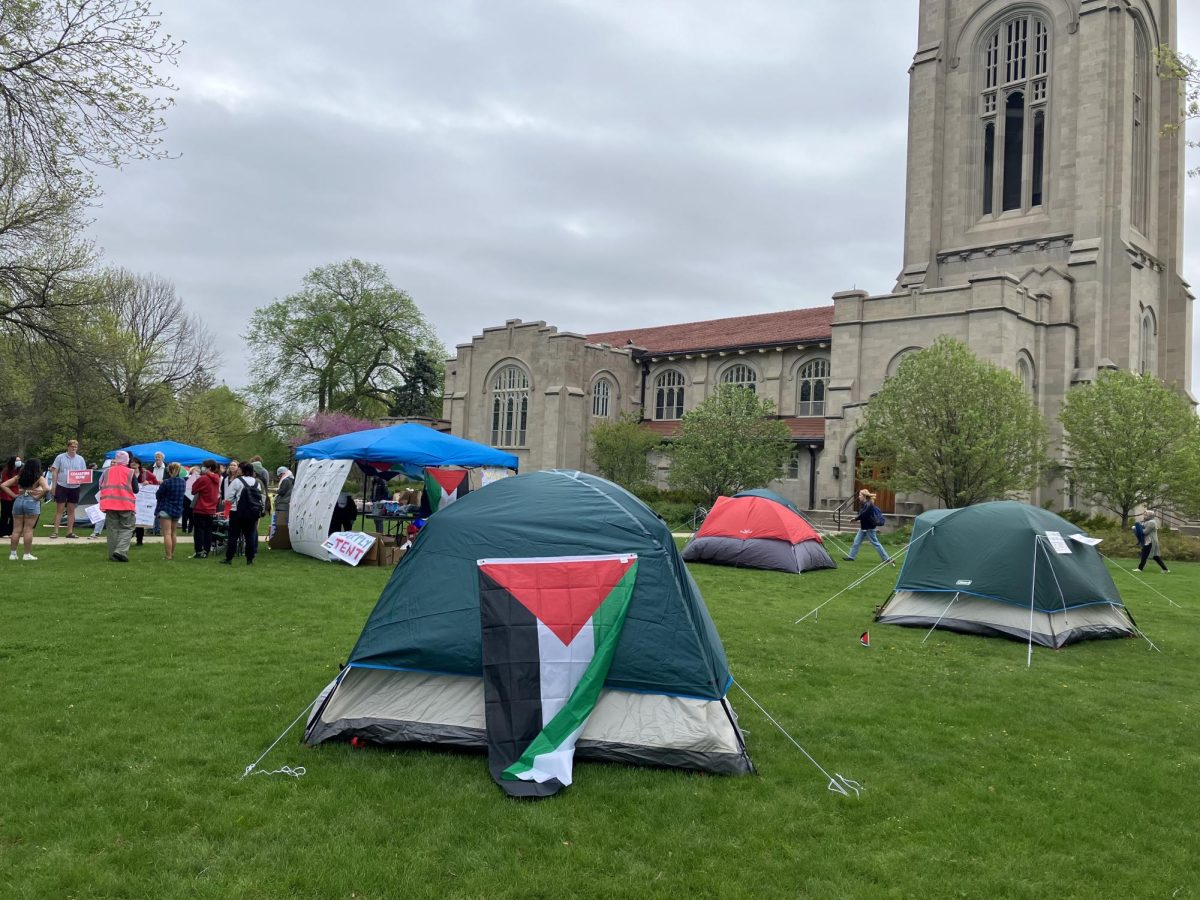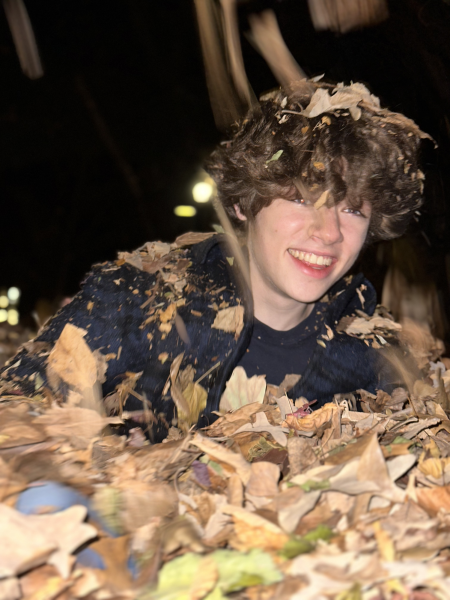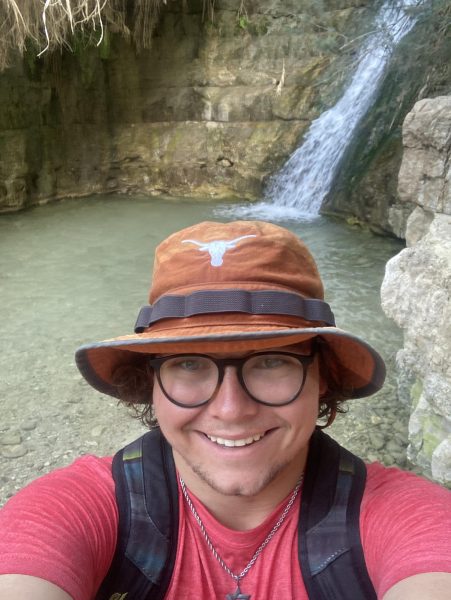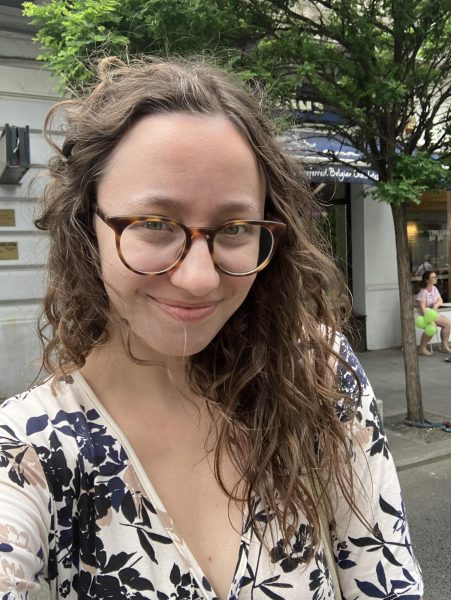On Friday, May 17, Carleton’s Students for Justice in Palestine (SJP) staged a sit-in in Laird Hall. Laird, which holds classes as well as the offices of the President and Provost, was closed to students after SJP announced the sit-in via Instagram that Monday. All classes were moved to other buildings, and the Laird offices were unoccupied throughout the day.
Students in SJP protested on the steps of Laird until around 1pm, when a faculty member used their OneCard to let students into the building. At the sit-in’s height, around 60 protestors were sitting in the building’s lobby and central staircase. A few hours into the sit-in, students were given a memo explaining that they needed to leave the building by 5pm or would be put on disciplinary probation.
The memo, circulated by Dean of Students Carolyn Livingston around 3 p.m., warned students that entering Laird when it was closed violated Carleton’s Community Standards Policy, fire code and building safety standards. It warned protesters that “while on Disciplinary Probation, any additional policy violations, including disregarding subsequent warnings, will lead to further sanctions. The next level of disciplinary action in our Student Conduct Process is suspension.”
The letter instructed students to leave Laird: “You can expect to receive notification of the disciplinary process later this evening, if you have not vacated the building.”
Security told the Carletonian that it would follow instructions from the administration if the students decided not to leave, and said that “we’re telling everyone to follow the letter.”
Shortly before 5pm, 10-12 students in SJP decided to remain in Laird while the rest left and closed the building’s doors. After 5 pm, faculty OneCards lost access to the building. Two security officers remained inside and collected the names of students continuing the sit-in. The security officers were inside the building as late as 10 p.m. on Friday, and presumably remained throughout the entirety of the sit-in.
The office of the president declined to comment on the allegations that a faculty member was the one who opened the doors to Laird.
The professor who let students into Laird told the Carletonian they haven’t been contacted by the administration. Campus security is able to track which [JUMP] OneCards have been used to open doors.
The professor, who has tenure, told the Carletonian that they let the students in because they “did not support the unilateral decision made by the administration to lock down the building without notifying faculty who do not teach or have offices there” and because they “support the students’ use of a sit-in at an administrative building as a peaceful yet powerful way to bring attention to the ongoing genocide in Palestine that claimed over 35,000 Palestinian lives, including at least 95 university professors.”
“While I was the one who opened the door, it was still the students’ decision to enter the building and to stay there as long as they ended up staying,” they said. “I witnessed how carefully they made their decisions and I admire and appreciate their care for each other as well as their solidarity and support for the people of Palestine.”
After 5 p.m., a group of roughly 50 protesters, including students and faculty, sat on the steps of Laird and held signs and posters while chanting sayings like “Shame” at the administration and singing historic protest songs like “We Shall Not Be Moved.”
At 6:01 p.m., an hour after students were supposed to leave the building, College President Alison Byerly emailed the student body saying that, “in learning of an anticipated SJP occupation of Laird Hall today, we closed the building and relocated classes to allow our academic work to continue uninterrupted, and to try to reduce the likelihood of a situation in which students would face disciplinary action.”
“An overnight student presence in a nonresidential building is a violation of fire codes and building safety standards, as well as an impediment to the overall functioning of the College, particularly at a time of year and on a weekend with many other events and functions occurring,” said Byerly in the email. “Our most sincere hope has been that students would safely and effectively share their voices without an escalated response that could put themselves or others at risk. The Dean of Students Office will now work through our disciplinary processes with the students remaining in Laird.”
The message said that Carleton “places great value on free speech” and that the administration’s goal has been “to try to prevent the need for confrontations that might lead to college discipline or other consequences.”
Byerly’s email further explained that she had met with members of SJP multiple times, including as recently as the Tuesday before the sit-in when she and Vice President of Equity, Inclusion and Community Dina Zavala, and when she hosted a meeting with SJP leaders, college trustees and the chief investment officer. “These meetings were freely offered in good faith, not as part of a negotiation, and felt like cordial and informative discussions,” Byerly said.
Byerly invited the students in Laird to meet with her on Saturday. They declined to leave Laird, and instead, a group of around 20 Carleton faculty, staff and alumni met with Byerly outside of Nutting house to deliver their demands, as well as one of their own. Among them was Associate Professor of History Amna Khalid, an expert on free speech and academic freedom, who told the Carletonian in an interview about the meeting.
“We went over there around 2:30 p.m. and we spoke with her and delivered the message of what the students wanted,” said Khalid. “And she agreed to what they asked for: a town hall meeting or a series of open meetings, expansion of the Middle East [Studies] program, and discussion about the financial aid or scholarship for Palestinian students.”
On top of the demands made by students and delivered by faculty, the faculty present at the meeting on Friday made an additional demand: no disciplinary action against the students in Laird.
“I urged the president and the administration to roll back, as an effort of good faith, the disciplinary actions against the students,” said Khalid. “I strongly urged them to roll back the actions.”
The groups’ goal was not solely to support SJP’s demands — some were concerned by the students’ right to protest rather than the specific subject of protest.
“I disagree with [some of SJP’s] demands. I stand firmly against an institution making political statements,” said Khalid. “I think it was wrong when they did it in the aftermath of Geroge Floyd and I think it was wrong when the president sent out that email after the Dobbs decision, even though it said at the end that, of course, people should feel free to discuss their viewpoints. But once you’re supporting one particular point of view, then it’s very hard to support other kinds of points of view.”
A student remaining in Laird, speaking for themselves under the condition of anonymity, said they wanted to continue the sit-in after the deadline because “it’s either a genocide or it isn’t, and I happen to believe that it is… I think [this] an opportunity for me to express that in the most straightforward way possible, and to put the administration in a position where they have to really show their colors.”
“[This] is pretty serious… I’m definitely [still] concerned about consequences, [but] I also recognize that in the context of everything else that’s happening right now, this is kind of small potatoes, and that makes me more calm.”
A present member of the faculty said, “I think what the students are doing is standing in the face of genocide, and that’s not something the college should be trying to discipline.” In response to the administration’s decision to close Laird and move classes, they said, “I think that that was premature. I think that there was no indication from the students that they had an intention to prevent classes from taking place, or that they endangered anybody’s safety.”
“Their presence should not be in and of itself considered a threat to the mission of the college. And they responded in a heavy-handed way and are continuing with this threat of sanctions against the students.”
Some students not part of SJP or the sit-in indicated that they did believe the administration’s response to the sit-in was to follow safety codes, and that the reasoning of President Byerly’s email was sound. Still, others indicated that they saw the administration’s response as an overreaction. One said, “[I] think it’s really stupid that they’re threatening disciplinary action… [the administration] is on the wrong side and [they’re] proving this by threatening [protestors] over something that’s so obviously not hurting anyone.”
Carleton’s SJP posted on their Instagram Saturday morning that an agreement had been struck with the college’s administration. This deal would include a larger town hall to discuss divestment, but did not include the administration meeting all of their demands. Said that post, all students left Laird at 3:55pm the day after the sit-in began.
Many students protesting shared thoughts and hopes regarding the administration’s comments, including those who were in Laird during the protest.
“Today was a win,” said Dash Rierson ’25 — one of the students who sat in — about the administrative response to the occupation of Laird. “We have a very long way to go, and we are well aware that the administration has given us nothing concrete in our main demands of divestment and acknowledgment of the reality in Palestine. Nevertheless, we have to be satisfied with what we’ve accomplished today as a result of our action.”
Many in the administration feel that their warning to the students involved in the sit-in was clear from the beginning and set a tone for future conversations. President Byerly outlined her thoughts in an interview with the Carletonian: “I understand that students may disagree with the College, or even be angry with us, but I believe it is important for them to trust that we mean what we say, whether it is a promise to meet or a warning about potential discipline,” she said.
“We outlined clear consequences for actions that violate College policy, and then applied those sanctions. I also told the students I would be happy to have an open meeting to discuss divestment, and we have announced those meetings.”
The students who sat in Laird, however, felt that their presence was justified. “I initially got involved with SJP after discussing the conflict with another member earlier this term, and with the encampment, I’ve gotten increasingly active,” said Rierson. “I was abroad over the Winter, so I didn’t have the opportunity to engage with the issue and express my view, so I have really tried to take full advantage of the opportunity this Spring.”
In a statement released by President Byerly on Thursday, the president outlined her vision for cooperation. “I invited the students to Nutting House [the President’s residence] that afternoon for a meeting, but they were not willing to leave Laird for that purpose,” said Byerly. “I also reiterated my willingness to hold two open meetings for the community—something we had discussed in a prior meeting on Tuesday—at which I and other administrators will discuss the College’s position on divestment and other issues related to the war in Gaza. Two open meetings are now scheduled for next week.”
In response to concerns about protests occurring during Carleton’s commencement on June 8, Byerly said she hoped that students would respect other students in the coming weeks. “We respect the desire of the SJP students to stimulate community awareness, and administrative attention, around the devastating humanitarian crisis in Gaza,” she said. “But as we look ahead to the final weeks of the term, I encourage those students to distinguish between effective, visible protest and disruption of college events and activities that are important to their fellow students and others in the community.”
Since the sit-in, signs have been put up outside of the president’s office reading “divest or we’ll be back.”












